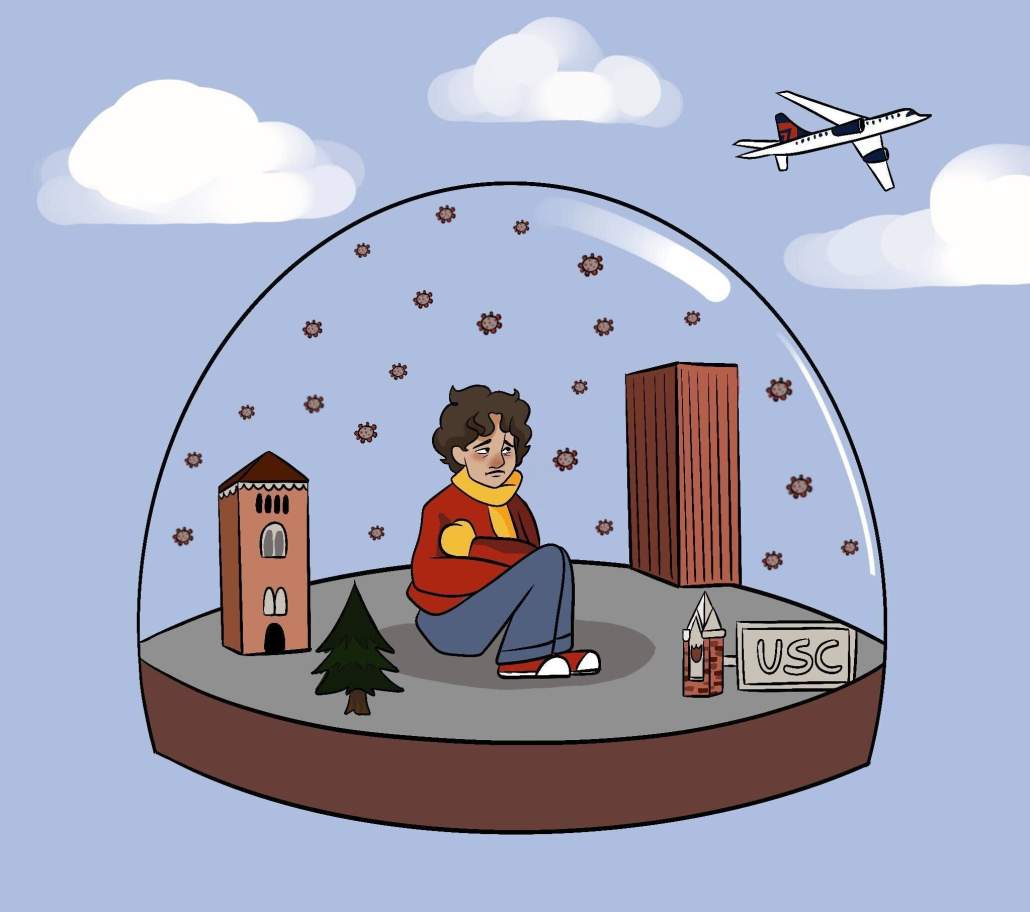International students face travel challenges

A few days before his scheduled departure on Dec. 8, Divyam Jindal, a freshman majoring in economics and mathematics, checked with American Airlines about his upcoming flight home to India. He was surprised to discover it had been cancelled, and he was rescheduled to a flight through London. That was soon canceled too, and he received a refund. Another booking and rescheduling later, Jindal finally arrived in Delhi on a Dec. 14 Qatar Airways flight, his ticket ultimately costing three times more than the original.
Throughout December, the rise of the omicron variant caused a slew of flight cancellations and changes in travel restrictions, disrupting travel plans for many. As the coronavirus pandemic continues to evolve, the uncertainty it brings continues to present a challenge for students, especially those who came to study at USC from abroad.
“During these times, you never know when a flight’s going to be canceled because of COVID or some other reason,” Jindal said. “Plus, even on the flight, you’re a little scared you might get COVID because of omicron spreading so rapidly … You get kind of afraid that flights might get banned altogether. There’s just a lot of stress that goes into planning an international trip during these times.”
Before winter break, Jindal evaluated the coronavirus situation in India at the time and talked to his friends in similar situations. If he went back home, there was a chance he wouldn’t be able to return to campus for in-person learning in the spring semester. On the other hand, Jindal was eager to see his family after his first four months away at college, and he knew being at home would provide a boost to his mental health. Ultimately, like several of his friends, he decided to make the journey.
“As an international student, it’s a big thing for me to come home. For the first time in my life, I have spent four months away from my family,” Jindal said. “The biggest pro was getting to see my family and my friends coming back home, just chilling out for a little bit. I really needed that.”
Once in Delhi, Jindal underwent a self-imposed quarantine for seven days. Over winter break, his building experienced an increase in coronavirus cases, putting it at risk of becoming a containment zone. Although the University postponed the start of in-person classes to Jan. 24, leading some students to delay their return to campus, Jindal flew back Jan. 10 in case a continued increase in coronavirus cases and restrictions in his building prevented his departure.
Beginning Dec. 17, the CDC requires individuals to take a coronavirus test between 24 and 48 hours before traveling to Los Angeles and between 24 and 48 hours after arrival. For Jindal, obtaining appropriate testing took careful coordination, especially for the day he planned to leave, when plane tickets were most affordable. Jindal’s flight to L.A. was on a Sunday, when most labs in Delhi, he said, are closed. Finding the right lab posed another issue.
“With the testing, it has been a little bit of a mess because some of the labs in India are not accredited to whatever is required by the airlines or the airport,” Jindal said. “And there are a lot of labs … You would be amazed.”
Several international students remained on campus over winter break, including Ricky Wang, a freshman majoring in sociology. He decided that the quarantine policies in his hometown of Beijing, China — a two-week hotel quarantine followed by a one week self-imposed quarantine — weren’t worth the trip.
“My parents told me about the policy, and when I knew, I just thought, ‘Yeah, let’s not go back. Let’s just stay,’” Wang said. “It’s fine because I’m not that homesick. I can eat Chinese food and speak Chinese with my friends. I can Zoom or call my parents whenever I want. It’s just the time difference.”
Over the break, Wang visited San Diego, played video games and spent time with his friends, who also could not go back home.
Faced with limited choices as well, Jessica Kim, a senior majoring in environmental engineering, remained in L.A. While born in South Korea, Kim mainly grew up in Taiwan. Some of her friends with Taiwanese citizenship debated going home, given the necessary arrangements of a two-week quarantine in an approved hotel and the heightened risks of contracting the coronavirus with the rapid spread of the omicron variant.
However, Kim was barred entry to Taiwan, as the country only allowed entry from citizens and permanent residents. The Korean citizenship that normally granted Kim entry to Taiwan was ineffective following pandemic-related border closures.
“I would have loved to travel, even if there was a chance,” Kim said. “The situation just made the decision for me … It’s been a while since I was able to go home, so going home was my first priority.”
In the weeks prior to the winter break and preceding the spring semester, the USC Office of International Services saw a rise in demand for consultations.
“In addition to the common topics such as maintaining immigration status, and employment eligibility, many students have contacted OIS in the past few weeks with concerns about international travel and how the pandemic may impact their ability to return to the U.S. in time for the spring semester and how that may affect their immigration status,” wrote OIS Assistant Director Anne Goldman in an email to the Daily Trojan. “Students want to know their enrollment options if they contract COVID and cannot travel, if their flights are cancelled or delayed, or if they can’t obtain a COVID test in time to board their plane.”
Hundreds of students each week have continued to obtain advisement on a number of visa and pandemic-related issues from the OIS. Besides live consultations, the OIS provides additional information to visa students through its weekly newsletters.

